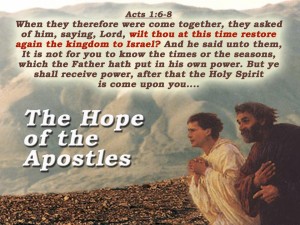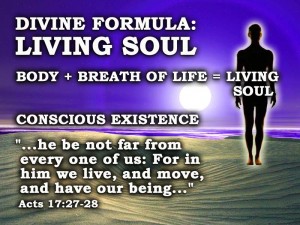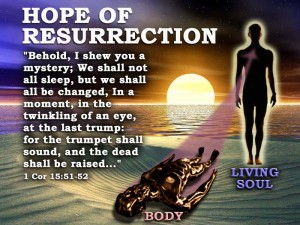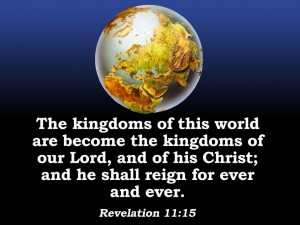The foundation laid by Jesus Christ and the Apostles
 It is now two thousand years from the time when Jesus Christ came to minister to “the lost sheep of the house of Israel”. The work of Jesus involved a spiritual revival within Judea, an awakening to the commands of God and the responsibilities for the caring He expected of His people. (Isaiah 61:1) Such a work involved a complete submission of will to the divine cause – and this was effected in a way that no other had been able to achieve. “I come to do thy will” it was written of him (Hebrews 10:7) and Jesus announced “I seek not mine own will, but the will of the Father which hath sent me”. (John 5:30)
It is now two thousand years from the time when Jesus Christ came to minister to “the lost sheep of the house of Israel”. The work of Jesus involved a spiritual revival within Judea, an awakening to the commands of God and the responsibilities for the caring He expected of His people. (Isaiah 61:1) Such a work involved a complete submission of will to the divine cause – and this was effected in a way that no other had been able to achieve. “I come to do thy will” it was written of him (Hebrews 10:7) and Jesus announced “I seek not mine own will, but the will of the Father which hath sent me”. (John 5:30)
The arrival of the Lord Jesus among his contemporaries, was like a shining light, continuing the strident and arresting message of his cousin, John the Baptist. John had been a recluse, “a voice” appearing in the record as bereft of personality, whereas Jesus mingled with the people and touched them with his penetrating gaze and kindly compassion. None could escape him; not the woman hoping to be healed incognito (Mark 5:30), nor the ruler from the Jewish parliament seeking to tentatively ‘sound out’ the Lord’s credentials! (John 3:1,2)
The ministry was no new thing. With the wonder of the miracles and the power of his teaching, the people readily accepted him as a prophet. But he was more than that. He was Son of God, Heir of the World, come to view his heritage on behalf of his Father, but “they received him not”. His ministry is closely linked with the ministry of the prophets. His only source of reference was to their messages, which were directly inspired from God. All his teaching was from the Hebrew Scriptures, from his first public synagogue preaching (Luke 4:4:17-22) to the 40 exclusive days the Lord shared with his disciples after his resurrection. (Luke 24:25-27; 44-48)
The small group of men, uneducated by worldly standards, with his blessing and the Holy Spirit guidance, launched a campaign that still reverberates around the globe – “Ye shall be witnesses to me” said the Lord (Acts 1:8) and witnesses they were. The community they established “were of one heart and one soul” (Acts 4:32) such was their unity.
They were transformed men, because they had been with the risen Lord. They fearlessly faced their own rulers, and the rulers of Rome, ignored angry mobs, disregarded personal safety; because they were all fired with living reality of Christ who had been raised from the dead, who was alive, and in due time would return to occupy the throne of the Kingdom of God (Acts 1:11; Luke 1:32,33)

The word of preaching went from place to place, characterised by contention (with the Jews) and careful analysis (with the Bereans) and derision from many Greeks. And in no time at all the growing band of believers faced their most deadly foe – the personal pride and ambition of man. Peter warned about it (2 Peter 2:1-3), Jude exposed their characteristics, Paul strove with them (Galatians 1:6-12; 2 Corinthians 11:13) and John, labelling them ‘anti-christ’, identified their key doctrine (1 John 4:1-3)
How did such divisiveness arise in a body that was initially, so united?
The Destructive Influence
With the christianisation of Rome, Hebrew learning and thinking came into abrupt conflict with Greek culture. Though Rome had conquered the world, Greek culture had “conquered Rome” and pervaded the world of learning. Greek thought is diametrically opposed to Hebrew thinking and with the rapid increase of non-Jewish converts, Bible teaching soon became overlaid with Greek philosophy.
The particular aspect of Greek philosophy that so affected man’s thinking was termed GREEK METAPHYSICS.
“Metaphysics” is that branch of philosophy which treats of the theory of knowledge in general, especially of the most speculative or esoteric nature. This kind of reasoning began with Aristotle, and characterised all Greek learning.
But because the Greeks provided such a vast store of literature and established schools, it easily became the educational base for learning in the West. There was simply no other recorded literature that could be used as a base. In this way, Greek philosophy, and the study of the classics for something like 1800 years, actually ensured that a corrupted view of Bible teaching remained popular. The philosophical approach to religion and science reasoned away fundamental Biblical doctrines, and soon affected the Israelitish nature of the Promises of God. A simple reading of early ‘church history’ soon makes this apparent.
Some of the key doctrines affected were:
Immortality of the Soul
This belief, so prevalent among the pagans, was introduced to the Greeks by the reasoning of Plato. Plato and his associates felt that their wisdom had advanced so remarkably, that it was incongruous to think that their ‘higher learning’ should one day end in ignominy and death. The Greeks divided the human personality into three distinct parts: body, soul and spirit.
The following extract from ‘Decline and Fall of the Roman Empire’ by Gibbon. (Vol 1; pg 448-9) shows this. Gibbon is a widely accepted eighteenth century historian, who gathered together all the records of the ancients in a very readable history.
“..There were a few sages of Greece and Rome who had conceived a more exalted idea of human nature, though it must be confessed that in the sublime enquiry, their reason had been often guided by their imagination, and that their imagination had been prompted by their vanity. When they viewed with complacency the extent of their own mental powers, when they exercised the various faculties of memory, of fancy, and of judgment, in the most profound speculations or the most important labours, and when they reflected on the desire of fame, which transported them into future ages, far beyond the bounds of death and of the grave, they were unwilling to confound themselves with the beasts of the field, or to suppose that a being, for whose dignity they entertained the most sincere admiration, could be limited to a spot of earth and to a few years of duration.
“With this favourable prepossession they summoned to their aid the science, or rather the language, of Metaphysics.
“They soon discovered that, as none of the properties of matter will apply to the operations of the mind, the human soul must consequently be a substance distinct from the body, pure, simple and spiritual, incapable of dissolution and susceptible of a much higher degree of virtue and happiness after the release from its corporeal prison. From these specious and noble principles the philosophers who trod in the footsteps of Plato deduced a very unjustifiable conclusion, since they asserted, not only the future immortality, but the past eternity of the human soul, which they were too apt to consider as a portion of the infinite and self-existing spirit which pervades and sustains the universe.
Footnote: The pre-existence of human souls, so far at least as that doctrine is compatible with religion, was adopted by many of the Greek and Latin fathers. See Beausobre, Hist. du Manicheisme, 1 vi. c 4″.
Modern historians recognise the unBiblical nature of the immortality of the soul. eg:-
“Plato in the Phaedo advances the view that at death the soul, being set free from the body, which is concerned with imperfect and transient things, goes to be at one with eternal goodness, eternal beauty, and the other Platonic “forms”, which are at once perfect and beyond the reach of change, and to which the soul is akin.
“For the Christian, immortality is bound up with Christ’s victory over death at Resurrection. Basically, Christian belief in immortality follows from Christian belief in God. The doctrine of the resurrection of the body and Paul’s conception of a spiritual body indicate that in some sense, however undefined, Christianity envisages a continuance of what we now know as the best elements of bodily life. In this way the Christian view differs from some of the Greek views of immortality, according to which the body was a tomb to be escaped from at death.” Encyclopedia International

The Hebrew knows of no such distinction between body and soul. In fact, the word the Hebrew scriptures use for ‘soul’ (nephesh), is also translated ‘body’ and is used of animals as well as humans, as an extract from article by a theologian shows:
“The Jews do not perceive of matter as a thing or an object but as an energy that we really ought to listen to. Matter too is part of the divine word of creation. Matter for the Jew is not a thing or an object but a word and deed, an energy. Furthermore, in Hebrew there is no word for ‘body’. Lacking even a word for it, the Hebrews obviously were not involved in controlling the body. In fact, for the Jewish mentality, ‘the body is nothing other than the living soul’. The body is the person and the person is the body…. There is no dualism, that is to say, separation of spirit and matter or spirit and energy in Jewish thinking. For this reason, the sensual is a gift and not a threat to the spiritual person…. We act as the imago Dei, the likeness of the Creator. In contrast, for Greek thought, the body is a cage that entraps and limits and stifles the release to the world of ideas that Plato so sought after.
“In summary, the Greek spiritual journey or way is ‘the soul’s way out of the world’ to a better and more fixed and permanent world. The Jewish spiritual journey is one of bringing about a new creation IN THIS WORLD, one characterized by justice and goodness and a commitment to the future.” Father Matthew Fox, OP, Director, Inst for Creation-Centred Spirituality, Mundelein College,Chicago
A simple analysis of the word soul (nephesh) throughout the Scripture will show this.
Example:
Ezekiel 18:4 “The soul that sinneth shall die”
Isaiah 53:11 “poured out his (Christ’s) soul unto death” i.e. Even righteous souls die.
1 Cor 15:20 There is No Hope apart from a resurrection.
Example 2:
Bible Teaching on Immortality
1 Timothy 6:16 God alone has immortality
2 Timothy 1:10 Jesus Christ brought immortality to light
Romans 2:8 We SEEK for immortality
1 Corinthians 15:53 We get immortality at the resurrection
1 Corinthians 15:54 Only then, can we say “death is swallowed up of victory”.
This second example clearly shows that we do not have immortality now ‑ we have to spend a life following Christ in a probation, before we are given it as a gift at the judgment seat of Christ.

Another false doctrine, “The Trinity” has its roots in paganism, its key influence being from Greek mythology. “Trinity” as a word NEVER occurs in the Bible. The Apostle John uses this doctrine to identify the ‘anti-christ’ in 1 John 4:1-3. This is a doctrine that denies the humanity of Christ, and makes him the second person of the trinity – God the Son. They are “deceivers” (2 John 7) and “false teachers who privately shall bring in damnable heresies, even denying the Lord that bought them” says Peter (2 Peter 2:1) They deny the Lord when they deny his humanity (compare Hebrews 2:14-18; 5:7-10).
THE PRE‑EXISTENCE, AND LATER TRINITY
In the Greek New Testament, the word “Logos” is widely used to mean simply “word”. A different word, “rhema,” indicates the spoken word. “Logos” indicates the plan or the purpose that God had in mind, when He conceived and later revealed His intention to man. Jesus Christ, is the Word (Logos) made flesh, who perfectly revealed and exhibited the purpose and moral excellence of God.
However, the Greeks, in their mythology, also used the word “Logos” for a sort of disembodied ‘something’, a lesser god, and this idea became confused with Jesus’s title “The Word (logos) of God”. In this way, the doctrine of the pre‑existence of Christ was born ‑ the concept that Christ existed as a god in heaven, before he was actually conceived of Mary. This is quite foreign to Bible teaching. However, because there is so much spoken of Christ prophetically in the Hebrew Scriptures (Old Testament), some people are easily confused. God promised, right from the beginning, that He would send His Son for the salvation of mankind. The repeated promises are only made fact when Jesus Christ is born, exactly as the angel said he would be to Mary. (Luke 1:35)
Trinity
A rift over the teaching of the Logos developed into an argument over the nature of the Lord Jesus Christ. As he was both Son of man and Son of God, the philosophers wrangled just how this could be.
The contention was so sharp, that Constantine the Emperor (who had just permitted freedom of religion with the Edict of Milan in AD313) became worried for the unity and security of his empire. As a result, he called a conference or council at Nicea in AD324 and presided over it himself, notwithstanding that he was a layman. It was this council that decided in favour of the Trinity: the teaching of God, Jesus Christ and the Holy Spirit being separate persons, each gods in their own right, yet mysteriously also One person.
In time, even churchmen came to acknowledge that the Trinity had no Biblical base but claim “it was a necessary development of church teaching”.
THE KINGDOM OF GOD
One of the central features of Biblical teaching, is that the Kingdom of God was the Kingdom Israel over which God’s anointed kings ruled. (1 Chronicles 28:5,6) An oath was confirmed with King David which guaranteed a continuance of this Kingdom (2 Samuel 7:12-16; Psalm 132), but wickedness of subsequent kings brought about the its temporary dissolution. (Ezekiel 21:25-27). Nevertheless, the restoration of the Kingdom of God over Israel was a very real hope in the heart of the believers, beginning with the announcement to Mary (Luke 1:32,33) and was part of the teaching of Christ (Matthew 19:28; Luke 19:11; Acts 1:6). As a key feature of apostolic doctrine (Acts 3:20-26; 2 Timothy 4:1), it clearly involved Israel’s restoration (Romans 11; Acts 15:14-17)

The teaching of a future Kingdom required non-involvement in the politics of the present, for “My Kingdom is not of this world..” (John 18:36), and the disciples were taught passive compliance with the affairs of this world (1 Peter 2:17-20) because they were to be “strangers and pilgrims on earth… looking for a city.. whose builder and maker is God” (Hebrews 11:13,10)
The growing church, however, soon came to see this belief as a deterrent to the distinct advantage of present power and influence. Gibbon in Decline and Fall, Volume 1 (Pages 454,455), comments:
“The near approach of this wonderful event had been predicted by the apostles; the tradition of it was preserved by their earliest disciples and those who understood in their literal sense the discourses of Christ himself were obliged to expect the second and glorious coming of the son of Man in the clouds…
“The ancient and popular doctrine of the Millennium (the 1,000 year reign of divine rule) was intimately connected with the second coming of Christ… And that Christ, with the triumphant band of the saints and the elect who had escaped death or who had been miraculously revived, would reign upon earth till the time appointed for the last and general resurrection… The assurance of such a Millennium was carefully inculcated by a succession of fathers from Justin Martyr and Irenaeus, who conversed with the immediate disciples of the apostles, down to Lactantius, who was preceptor to the son of Constantine. Though it might not be universally received, it appears to have been the reigning sentiment of the orthodox believers; … But when the edifice of the church was almost completed, the temporary support was laid aside. The doctrine of Christ’s reign upon earth was at first treated as a profound allegory, was considered by degrees as a doubtful and useless opinion, and was at length rejected as the absurd invention of heresy and fanaticism.”
Thus the ancient hope of the Scriptures was relegated to the dust heap in favour of a well organised church with political aspirations. As a result, the church proclaimed itself: the Kingdom of God.
WORSHIP OF SAINTS
In an endeavour to live in holiness, some men and women separated themselves from ordinary life to live alone in extremity and poverty, or later, join monasteries. An asceticism developed, separating man from family life and ordinary contact with his fellows. There is no Biblical justification for this.
Some of these ‘holy people’ became venerated, and in time invested with ‘sainthood’ by the church. They became a sort of ‘lesser gods’. This was accepted by a people who had been used to a multiplicity of pagan gods and statues in their temples. As one writer commented, they simply changed the nameplates on the statues (Venus to Mary and so on) and put up a new sign outside: “under new management”. Gibbon also comments that those who joined the cloister soon found opportunity for power and wealth that would have been denied to them in their former life. “Ambition soon discovered the secret road which led to the possession of wealth and honours…. The Monasteries were filled by a crowd of obscure and abject plebeians who gained in the cloister much more than they had sacrificed in the world.” (Gibbon’s Decline and Fall of the Roman Empire, P6-8 of Volume 4)
And so the growth of the power of priesthood and papacy assumed monumental proportions, until all who questioned their authority became quite literally fuel for the fire. It has been conservatively estimated that 56 millions perished over the years at the hands of the church.
THE FALLING AWAY, or THE APOSTASY
 These great departures from Bible doctrine were a fulfilment of a last prophecy of the Apostle Paul who, knowing the hearts of men to desire position and prominence, had said, “For I know this, that after my departing shall grievous wolves enter in among you, not sparing the flock. Also of your own selves shall men arise, speaking perverse things, to draw away disciples after them.” (Acts 20: 29,30)
These great departures from Bible doctrine were a fulfilment of a last prophecy of the Apostle Paul who, knowing the hearts of men to desire position and prominence, had said, “For I know this, that after my departing shall grievous wolves enter in among you, not sparing the flock. Also of your own selves shall men arise, speaking perverse things, to draw away disciples after them.” (Acts 20: 29,30)
An early historian, Eusebius (4th Century) wrote : “They presume to alter the holy Scriptures, to abandon the ancient rule of faith and to form their opinions according to the subtle precepts of logic. .. Aristotle and Theophrastus are the objects of their admiration and they express an uncommon reverence for the works of Galen… and they corrupt the simplicity of the Gospel by the refinements of human reason.”
Gibbon sadly commented on these times: “The church still continued to increase its outward splendour as it lost its internal purity.” (Volume 1 p 496 of Decline and Fall)
LITURGY
Over the years, the church developed a system of tradition and various types of services and observances of holy days and feast days. The priestly activity and vestments were unknown in the early congregation. They are all quite without apostolic precedent.
GETTING BACK TO NEW TESTAMENT PRACTICE
With the completion of the observance of the ritual and law of Moses, the Scriptures only support two ceremonies, baptism and breaking of bread. The church hierarchy and tradition has taken away personal knowledge and personal faith ‑ absolutely vital for acceptance with God. “This is life eternal: to know thee, the only true God and Jesus Christ whom thou hast sent” (John 17:3).
Baptism A command of Jesus (Mark 16:16), practised in apostolic times (Acts 2:38)
After baptism they continued in:
Breaking of Bread: The second ceremony which was commanded to be kept. (cp Acts 20:7)
Fellowship: Describes the sharing of the believers, who are welded together as the body of Christ (Ephesians 4:12‑16).
Apostles’ Doctrine: The teaching of the Apostles must be followed. It is the foundation, along with Jesus Christ (Ephesians 2:19,20). Jesus said “Ye are my friends, IF ye do whatsoever I command you.” (John 15 ). Later on, because of particular difficulties, several points had to be clarified. This was done at the Jerusalem Conference. (Acts 15)
Prayers: Without communication with God, we are not under His guidance, which we need.
Where do Christadelphians fit into the picture?
 Christadelphians arose during a time of intense Bible interest. Education for ordinary folk was opening up, and the promotion of the distribution of the Bible by the British and Foreign Bible Society from the beginning of the 19th century, increased its ready availability.
Christadelphians arose during a time of intense Bible interest. Education for ordinary folk was opening up, and the promotion of the distribution of the Bible by the British and Foreign Bible Society from the beginning of the 19th century, increased its ready availability.
With the wider distribution of the Scriptures and the work of men like Wesley and Knox, who promoted the concept of PERSONAL FAITH, a great interest arose in public and private discussion of the teaching of the Bible. In the past, this had been largely the province of the learned and the churchmen.
In this fervour of searching for Bible truth, the Christadelphians came about, not by plan, but beginning with the searching of one man. Originally Dr. John Thomas (the son of a clergyman) was associated with the Church of Christ (formerly known as Campbellites), but his continual studies led him to question the teaching of the Campbellites, not before however, many of their congregations in both America and Englandhad listened to his exposition of the Scriptures. His classical education, and knowledge in both Greek and Hebrew, helped equip him in his search for Bible truth, and he came to endorse what a number of reformers had found, that the churches were largely astray.
Small groups came together as a result of his teaching, and provided the stimulus for each other as well as a necessary critical analysis of John Thomas’ study. A key element in his Biblical exposition, was the emphasis on Israel. He saw the promises of God centred in Christ, who was the heir to the promises, and that the promises were Israelitish in character. (Ephesians 2:12, 13) He found that this meant the future Kingdom of God would be set up on political lines, following the constitution of the old Kingdom of Israel over which David and Solomon ruled. This is what Peter had meant by referring to the “restitution of ALL THINGS” (Acts 3) and what Christ had promised his disciples, that they “would sit on thrones judging the twelve tribes of Israel” (Matthew 19). It was the reason that Paul was in chains, “bound for the Hope of Israel” as he said (Acts 28:20)
The Name “Christadelphian” is given
At the time of the American Civil War (1861-5) believers, who simply called themselves “brethren of Christ”, found that they were on opposite sides of the fence. Their understanding of the Scriptures had led them to stand apart from politics, and for the same reason, “as strangers and pilgrims on earth” (Hebrews 11:13) they also refused to fight to maintain civil life which they believed that Christ would soon come to dispense with in any case.
They sought exemption from serving in the armed forces and the authorities required a name by which they be known. The custom of the day, to call themselves after their mentor, was prevented by protest of John Thomas, who believed that their sight should firmly be fixed upon Christ as head of the body. The name ‘Christadelphian’ simply means ‘brother of Christ’.
THY WORD IS TRUTH
 The claims of God’s revealed Word are both clear and consistent, leaving no room for the theories of man. God, as Creator, has a personal interest in objects of His creation, and will yet call men and women to account for the privilege of their life on earth and the benefits He has provided. (Acts 17:31)
The claims of God’s revealed Word are both clear and consistent, leaving no room for the theories of man. God, as Creator, has a personal interest in objects of His creation, and will yet call men and women to account for the privilege of their life on earth and the benefits He has provided. (Acts 17:31)
The present distress upon the earth is simply because men and women have neglected to follow the ‘manufacturer’s instructions’ and they are reaping the consequences. The only remedy is to return to the divine specifications, to open the manufacturer’s handbook and operate according to the instructions therein. But the pride of man will usually not let him do that.
No human can be truly fulfilled unless he lives in harmony with creation – both the physical laws of our planet and spiritual code divinely placed to govern our behaviour. God has made men and women “in his image and in his likeness”. We can never fulfil the purpose of creation, unless we fashion our lives according to Him. Instead, the vast majority allow worldly ambition and fashion to quite literally squeeze them into their mould. Thus the “god of this world hath blinded the minds of them which believe not” (2 Corinthians 4:4).
“Be not conformed to this world, but be ye transformed by the renewing of your mind, that ye may prove what is that good and acceptable and perfect will of God” (Romans 12:2)
Ours can be a new life in Christ, and though we may be buffeted with the problems that affect our race, we can look beyond to the time when we will be perfected both morally and physically, “fashioned like unto his glorious body” (Philippians 3:21). Then we will have our strength renewed, “shall run and not be weary, shall walk and not faint”. (Isaiah 40:31) “I will rejoice in Jerusalem and joy in my people: and the voice of weeping shall be no more heard in her, nor the voice of crying” (Isaiah 65:19)




